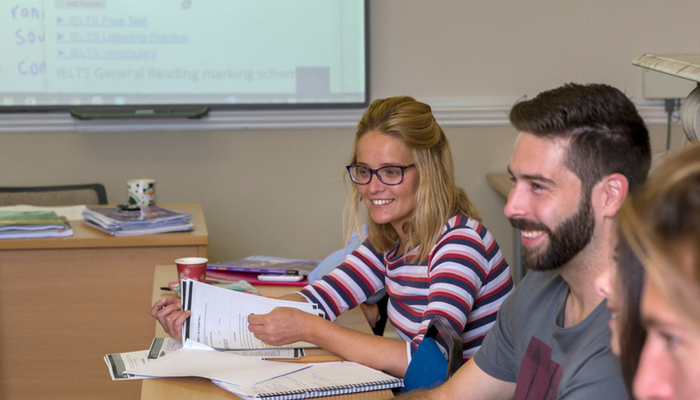- Why Improving English Language Skills Matters in Education
- Enhanced Collaboration Opportunities
- Career Advancement
- Leveraging Erasmus Funded Programs for English Language Enhancement
- Effective Communication Skills
- Improving English Language Skills – English for the Educational Workplace
- Building Confidence through Improved English Language Skills
- Enhanced Presentation Skills
- Access to Global Opportunities
- Competitive Advantage
- The Rising Importance of English in International Education
- Cultural Exchange and Diversity
- Ireland: A Premier Destination for English Language Learning
- Access to Quality Language Programmes
- Conclusion
Learn more about professional English language programmes and start dates at our centres
Improving English Language Skills for Education Staff: Leveraging Erasmus+ Programs and Ireland’s Role in achieving success

In an increasingly globalized world, English language proficiency has become a vital asset for professionals across various sectors, particularly in education. From primary and secondary school teachers to university lecturers and administrative staff, effective communication in English is essential for collaboration, career advancement, and participation in international projects. This blog intends to delve into the importance of improving English language skills for staff in education, the role of Erasmus funded programmes in this endeavour, and why Ireland stands out as a prime destination for English language learning.
Why Improving English Language Skills Matters in Education
English Language Skills in Educational Settings
In educational institutions, staff members with strong English language skills can effectively communicate with colleagues, students, and stakeholders from diverse linguistic backgrounds. This proficiency facilitates the exchange of ideas, the delivery of high-quality education, and the implementation of innovative teaching methods. At Atlantic Language School, Galway; participants have the option of selecting one of three transformative Erasmus+ courses – English for Professional Communication, English for the Educational Workplace, or an Intensive General English programme. All three one-week courses are demanding and communicative courses which aim to equip professionals to confidently present, network and liaise across a range of media, with external stakeholders in internationalised settings where English is the language of communication. A specialist team of trainers employ a collaborative approach to course delivery, utilising pre-arrival questionnaires and needs analyses to adapt the course in ways that will maximise outcomes for participants.
Enhanced Collaboration Opportunities

Proficiency in English opens doors to international collaboration projects, research initiatives, and academic exchanges. Staff members with strong English skills can engage with peers globally, enriching their professional network and fostering cross-cultural understanding. In preparation for this experience, Erasmus+ participants at Atlantic Language School will benefit from interactive teaching styles with input sessions, individual and group work. Over the course of the week, students will enjoy brainstorming sessions, analysis, and problem-solving activities, alongside engaging role-plays to encourage accuracy and fluency, therefore greatly improving English language skills.
Career Advancement
For educators and administrative staff alike, proficiency in English can significantly enhance career prospects. Whether seeking opportunities for professional development, advancement within their institution or pursuing international positions, fluency in English is often a prerequisite. Whether they are faculty members, administrators, or staff, enhancing English language skills can significantly impact their professional trajectory.
Firstly, improved English language proficiency opens up avenues for communication and collaboration on an international scale. Many higher education institutions engage in partnerships, research collaborations, and academic exchanges with institutions and scholars worldwide. Proficient English speakers can actively participate in these endeavours, contribute effectively to discussions, publish research in prestigious journals, and secure grants and funding opportunities that require English proficiency.
Secondly, English is often the lingua franca of academic discourse. In fields ranging from science and technology to humanities and social sciences, a sizeable portion of scholarly work is published in English. For employees in higher education, especially researchers and academics, possessing strong English language skills is essential for accessing and understanding the latest advancements in their respective fields. It enables them to stay updated with cutting-edge research, incorporate relevant findings into their teaching, and produce high-quality academic publications that enhance their professional reputation.
Moreover, in an increasingly competitive job market, candidates with proficient English language skills stand out to recruiters and hiring committees. Whether applying for teaching positions, administrative roles, or leadership positions within higher education institutions, the ability to communicate fluently and confidently in English demonstrates professionalism, adaptability, and readiness to engage with diverse audiences.
As higher education becomes more globalized, institutions prioritize candidates who can contribute to fostering an inclusive and multicultural learning environment. Employees with strong English language skills can effectively engage with students and colleagues from diverse linguistic and cultural backgrounds, facilitating cross-cultural understanding and enriching the overall educational experience.
Improving English language skills is indispensable for career advancement in higher education. It not only enhances professional opportunities but also fosters international collaboration, academic excellence, and inclusive learning environments. As such, investing in language proficiency programs and resources can greatly benefit employees and their institutions in today’s dynamic educational landscape.
Leveraging Erasmus Funded Programs for English Language Enhancement
Erasmus+ Programs: A Gateway to Language Improvement
Erasmus+ is the EU’s programme to support education, training, youth, and sport in Europe and currently has an estimated budget of €26.2 billion. The 2021-2027 programme places a strong focus on social inclusion, green and digital transitions, along with promoting young people’s participation in democratic life.
Key Action 1 (Learning Mobility of Individuals) is the most funded action in the Erasmus programme 2021 -2027 and provides an exciting opportunity for individuals to partake in international training programs in Ireland.
KA1 actions provide both positive and long-lasting learning experiences for not only the students but the organisations involved. Participants are offered a unique opportunity to study with two of the most esteemed Language Schools in Ireland, Atlantic Language School, or The Galway Language Centre.
Erasmus+ programmes offer staff in educational institutions invaluable opportunities to enhance their English language skills through structured courses, workshops, and immersive experiences. These initiatives provide tailored language training designed to meet the specific needs of educators, administrators, and researchers.
Effective Communication Skills
Participating in Erasmus funded courses equips staff with the language tools necessary for effective communication in educational settings. From delivering presentations and facilitating discussions to drafting academic papers and correspondence, enhanced English proficiency enhances overall communication effectiveness. Team camaraderie and strong relationships within a business stem from shared interests, office small talk and peer discussions. Learning cultural nuances, including English colloquial expressions, encourages better communication and helps build a positive work culture. Low English proficiency can at times, lead to miscommunication, misunderstandings, and errors. By improving English language skills, staff can confidently express themselves, liaise effectively with colleagues, and interact with external clients.
Improving English Language Skills – English for the Educational Workplace
Erasmus programmes often include modules focused on English for the workplace, addressing the unique linguistic demands encountered in educational environments. This targeted training ensures that participants can confidently navigate professional interactions, business meetings, and complete daily administrative tasks such as compose and respond to emails in English, for example.
Building Confidence through Improved English Language Skills
Overcoming Language Barriers
Improving English language skills instils confidence in speaking and writing, empowering staff to overcome language barriers and express themselves articulately in various contexts. This confidence enables educators to engage more effectively with students, colleagues, and stakeholders, fostering a conducive learning environment.
Enhanced Presentation Skills
Proficiency in English enhances staff members’ ability to deliver engaging presentations, lectures, and workshops, captivating audiences and conveying complex concepts with clarity. Enhanced presentation skills not only enrich the learning experience but also bolster professional credibility and visibility. The Erasmus courses provided by Atlantic Language School and The Galway Language Centre at Bridge Mills ensure that students gain the necessary skills to deliver compelling presentations, while teacher trainers endeavour to create a student-led and empathetic environment in which students can thrive, helping to eliminate any public speaking nerves in the process.
Access to Global Opportunities
Proficiency in English opens doors to a myriad of career opportunities on the international stage. Educators with strong English language skills can pursue teaching positions, research opportunities, and administrative roles in institutions worldwide, expanding their professional horizons.
Competitive Advantage
In an increasingly competitive job market, fluency in English sets candidates apart, demonstrating their readiness to thrive in multicultural environments and contribute to global academic discourse. Whether seeking positions in education, research, or administration, proficiency in English enhances employability and marketability.
The Rising Importance of English in International Education
Facilitating Collaboration
English has emerged as the lingua franca of international education, facilitating collaboration among staff and students from diverse linguistic backgrounds. Proficiency in English enables seamless communication and collaboration in joint research projects, academic conferences, and student exchanges.
Cultural Exchange and Diversity
English proficiency fosters cross-cultural understanding and promotes diversity within educational institutions. Staff and students from different countries can engage in meaningful dialogue, exchange perspectives, and celebrate cultural differences, enriching the educational experience for all stakeholders.
Ireland: A Premier Destination for English Language Learning
Ireland’s Reputation as an English Language Hub
With its rich cultural heritage, vibrant cities, and renowned educational institutions, Ireland has emerged as a premier destination for English language learning.
Access to Quality Language Programmes
Ireland boasts a wide range of language schools, universities, and training centres offering high-quality English language programmes which cater to various proficiency levels and learning objectives. Participants in Erasmus funded programmes can benefit from these resources, while enhancing their English language skills.
Additionally, Ireland’s English-speaking environment extends beyond academia, permeating everyday interactions and facilitating immersive language practice outside the classroom. With its friendly locals, supportive academic community, and emphasis on multiculturalism, Ireland not only fosters professional growth but also offers an enriching cultural experience, making it an ideal destination for higher education staff seeking to improve their English language proficiency.
Conclusion
In conclusion, the importance of improving English language skills for staff in education cannot be overstated. From facilitating effective communication and collaboration to enhancing career opportunities and global engagement, proficiency in English is a key driver of success in the field of education. Through Erasmus funded programmes and initiatives, staff members can access tailored language training, develop essential skills, and unlock new opportunities for personal and professional growth. As English continues to play a leading role in international education, investing in language enhancement is essential for staying competitive, creating inclusive learning environments, and promoting cross-cultural understanding in an interconnected world.
Authors: Dee Maher and Nancy Angeloni, Atlantic Language Galway
